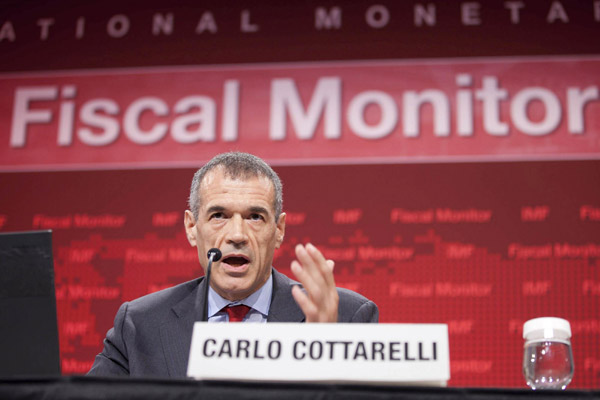IMF: Global economy enters dangerous new phase
Updated: 2011-09-21 10:05
(Xinhua)
|
|||||||||
 |
|
International Monetary Fund (IMF)'s Director of Fiscal Affairs Department Carlo Cottarelli presents the Fiscal Monitor Press Conference at the IMF Headquarters in Washington September 20, 2011. [Photo/Agencies] |
WASHINGTON - The International Monetary Fund (IMF) on Tuesday downgraded global economic outlook as two-speed growth continues with advanced economies growing sluggish and emerging markets becoming relatively robust.
World output growth would be 4 percent both in 2011 and 2012, 0.3 and 0.5 percentage point lower than its June forecast.
The figures are contained in the IMF's latest World Economic Outlook report, the flagship product of the Washington-based international institution.
Uneven growth continues
"The global economy is in a dangerous new phase," the report said. "Global activity has weakened and become more uneven, confidence has fallen sharply recently, and downside risks are growing."
The Fund noted that, against a backdrop of unresolved structural fragilities, a barrage of shocks hit the world economy this year, including the devastating earthquake and tsunami in Japan and unrest in some oil-producing countries.
At the same time, the U.S. economy had stalled, the euro area encountered major financial turbulence, and global markets suffered a major sell-off of risky assets.
The report said the forecast for advanced economies was gloomier due to the continuing evolution of the sovereign debt crisis in Europe, with increasing market worries about a debt default in Greece.
The IMF projected that growth in advanced economies in 2011 and 2012 would only reach 1.6 percent and 1.9 percent, slower than its projections in June.
The structural problems facing the crisis-hit advanced economies had proved more intractable than expected, and the process of devising and implementing reforms even more complicated, the Fund said.
The outlook for these economies was thus for a continuing, but weak and bumpy expansion, it said.
For emerging market economies, growth was expected to remain fairly robust, especially in economies that could counter the effect on output of weaker foreign demand with less policy tightening, the IMF said.
China's economic growth was expected to remain robust at 9.5 percent this year and 9 percent in 2012 after growing 10.3 percent in 2010. India will grow 7.8 percent and 7.5 percent respectively.
Fiscal challenge pressing
Among all the challenges, fiscal challenge, especially the sovereign debt crisis in Europe remains the key problem that drags world prospect.
Global fiscal environment remains subject to a "high degree of risk," despite progress in addressing key fiscal weaknesses in many countries, the IMF said in a separate report released Tuesday.
Not only many advanced economies that are suffering urgent fiscal challenge, emerging and developing economies also face increasing fiscal problems, noted the IMF in its latest Fiscal Monitor report.
"Within the euro area, many countries have made good progress in reducing high deficits and specifying medium-term plans and have committed to enhancing fiscal institutions," said the IMF." Nevertheless, borrowing spreads have risen significantly in larger economies, including Italy and Spain, showing that market sentiment can change abruptly."
In Japan and the United States, progress in defining and implementing fiscal adjustment plans has been more limited, but interest rates remain at historically low levels. In the United States, although a last-minute agreement to lift the debt ceiling was reached, the political impasse that preceded the deal illustrates the significant challenges to implementing fiscal adjustment going forward, reflected in a downgrade by one rating agency.
Among emerging economies, where the needed medium-term fiscal adjustment is generally lower, the fiscal stance is nevertheless insufficiently tight in some cases in view of inflationary pressures and rapid growth, fueled in part by strong capital inflows, noted the Fund.
"Strong policies are needed to improve the outlook and reduce the risks," said Olivier Blanchard, the IMF's chief economist in a statement.
He stressed that policies need to rely on three legs, in which fiscal policy is the top priority.
Blanchard suggested that fiscal consolidation cannot be too fast or it will kill growth. It also cannot be too slow or it will kill credibility. "The speed must depend on individual country circumstances, but the key continues to be credible medium-term consolidation," he said.
The chief economist also urged policy makers to take financial measures to improve banking system health.
The 187-member nation fund conducts economic analysis and lends money to countries in financial distress. It will hold its annual meetings with its sibling institution -- the World Bank -- later this week in Washington.











